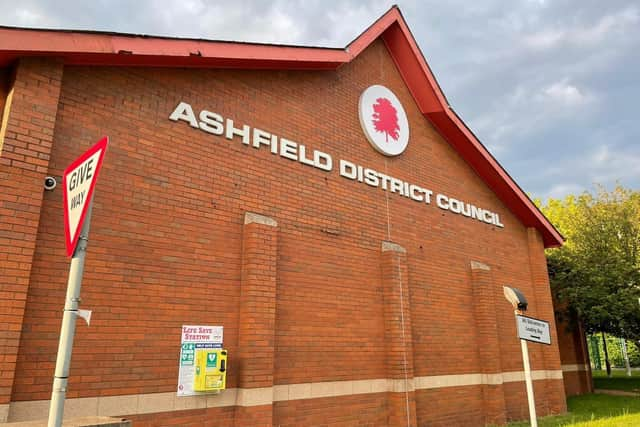Two Nottinghamshire councils suffer some of big drops in core spending power
and live on Freeview channel 276
Councillors from both authorities say taxpayers are not getting “value for their money" from Whitehall and suggest “difficult decisions” could be on the horizon.
The 2023-24 Local Government Settlement shows Ashfield has suffered the second-biggest drop in core spending power of all 333 English councils.
Advertisement
Hide AdAdvertisement
Hide AdCore spending is the term used to determine how much money councils should have to pay for key services, like housing and waste collection.


It takes into account Government support and income like business rates, with each council’s levels compared with 2015-16 levels in Whitehall spreadsheets.
It also assumes authorities will raise council tax 2.99 per cent – the most allowed – in the coming financial year.
The data shows the Ashfield Independents-led council’s spending power will be 10.5 per cent lower next year than 2015-16.
Advertisement
Hide AdAdvertisement
Hide AdIt means the council is expected to have £12.8 million available to spend from April, compared with £14.3m eight years ago.
This comes despite the authority being granted a 4.6 per cent spending power rise next year compared with 2022-23, working out at £600,000 more.
Coun David Martin, council cabinet member for finance, said: “The settlement leaves councils like Ashfield on the breadline and facing difficult decisions.
“Given rising energy costs and inflation predicted to hit 14 per cent, we will be even worse off. This ‘settlement’ represents a real-terms cut.”
Advertisement
Hide AdAdvertisement
Hide AdLabour-run Gedling Council is the fifth-worst nationally, having seen an 8 per cent cut since 2015-16, falling from £12.7m to £11.6m next year.
Coun Michael Payne, council deputy leader, said: “This is the difference between services staying open or closing.
“How is it defendable that people work hard, pay tax and are not getting value for their money?
“It’s wrong, unfair and needs to change.
“This is hard-working taxpayers’ money and their areas are being let down by the Government.”
Advertisement
Hide AdAdvertisement
Hide AdLabour-run Mansfield is the 11th-most affected England council, with a 5 per cent fall since 2015, while there was also a 3.2 per cent drop at Labour/Liberal Democrat coalition-controlled Broxtowe – the 18th-biggest fall in England.
However, some Nottinghamshire councils have seen spending power rise.
Tory-run Newark & Sherwood Council saw a 4.3 per cent increase, while Labour-led Bassetlaw had a 6.2 per cent rise.
Conservative-controlled Rushcliffe saw the biggest increase of Nottinghamshire’s lower-tier authorities, at 12.8 per cent.
Advertisement
Hide AdAdvertisement
Hide AdEngland councils as a whole saw a 32.7 per cent average increase over the eight-year period.
Only Tory-run Nottinghamshire Council bettered this rate, with a 41.5 per cent increase over eight years, the 10th-best nationally.
It means the council should have £698.9m to fund services in 2023-24, up from £493.9m in 2015-16 and £633.2m in 2022-23, with the authority getting a 10.4 per cent year-on-year increase in its spending abilities.
A four-week consultation on the settlement will run in the new year and Coun Martin and Coun Payne urged their MPs to lobby for more money.
The Government did not respond to a request for comment.
Advertisement
Hide AdAdvertisement
Hide AdHowever, Levelling Up, Housing and Communities Secretary Michael Gove said: “Local government plays a vital role in helping us level up, support the vulnerable and deliver services people rely on.
“We recognise the pressures councils are facing.”
